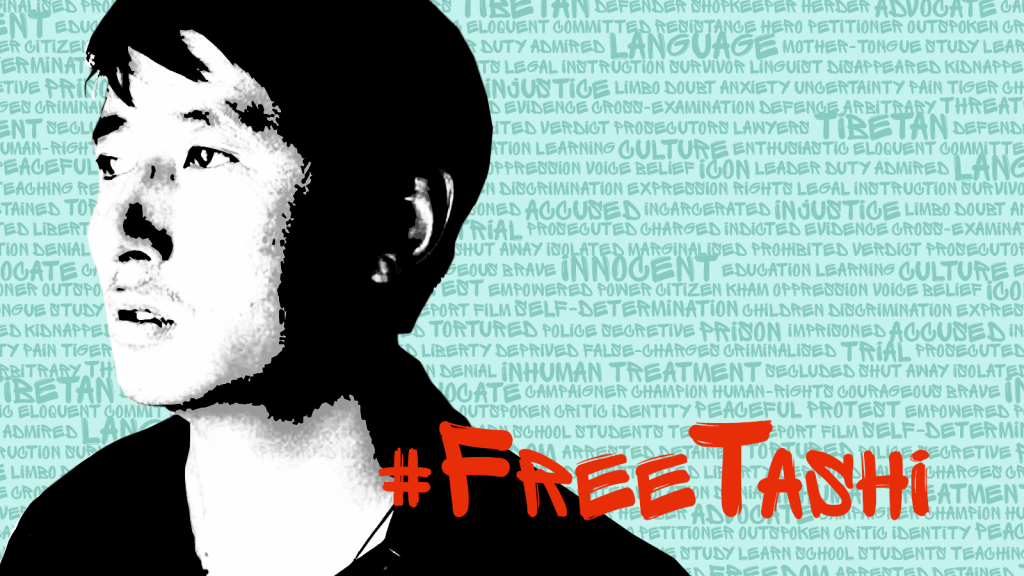Nothing is permanent, so everything is precious. Here’s a selection of some happenings—fleeting or otherwise—in the Buddhist world this week.
Tibetan Language Advocate Released from Prison
Tashi Wangchuk has been released from prison, according to the New York Times. The 35-year-old Tibetan-language advocate was arrested after calling for the Chinese government to honor its laws allowing bilingual education for ethnic minorities. Wangchuk, who was accused of “inciting separatism,” completed a five-year sentence and has returned to his hometown in the province of Qinghai, his lawyer, Liang Xiaojun, said on Twitter and in a telephone interview with the Times.
Wangchuk had originally taken up his cause after the Chinese government ramped up restrictions on teaching Tibetan in schools. The Times had documented Wangchuk’s efforts to save the Tibetan language—which China used against him during his trial. “In our Tibetan region, from primary and middle schools to high school, there’s only one Tibetan language course among many courses,” Wangchuk said in a Times documentary about his journey to Beijing in 2015 to make his case to Chinese officials and state media. “No one wants to live in an environment that’s full of pressure and fear,” he said. “In effect, there is a systematic slaughter of our culture.” Chinese police detained Mr. Tashi two months after the Times reports about him came out. Despite Wangchuk’s release, Mr. Liang said he could not be sure that Mr. Tashi was “fully free.” In China, former prisoners can be confined to their homes even after their formal release, especially in politically contentious cases.
1. Today marks four years since the Chinese government arrested Tibetan language rights activist Tashi Wangchuk after he appeared in a NYT video I made. https://t.co/nin1A2KXI4
— Jonah M. Kessel (@jonah_kessel) January 28, 2020
Young Asian American Buddhists Connect in Online Forum
A new online forum is offering a place for young Asian American Buddhists to connect, the Religion News Service (RNS) reported. Co-founder Devon Matsumoto, whose grandfather helped build the Mountain View Buddhist Temple in the San Francisco Bay Area after World War II, designed Young Buddhist Editorial as a space where millennial and Gen Z Asian American Buddhists could share their writing, photography, and art. “We noticed that being Buddhist and being Asian American, our stories are being told for us,” Matsumoto told RNS. “One of our big pushes is to have our communities tell our stories.” Young Buddhist Editorial also hopes to keep young adults connected to Buddhism at a time when many are rethinking their relationship to the temple, Matsumoto said. While disaffiliation is common among young adults from all religious backgrounds—more than one-third of millennials are religiously unaffiliated, according to Pew—the rate is even higher among Asian American Buddhists. Just 56 percent of first-generation and 48 percent of second-generation Asian American Buddhists retained their religion of origin, a lower rate than Asian American Catholics, Protestants, Muslims, and Hindus. Chenxing Han, author of the new book Be the Refuge: Raising the Voices of Asian American Buddhists, told RNS that as a “double minority,” Asian American Buddhists often feel pressure from both the dominant white culture and the Asian American community to assimilate into Christianity. Negative stereotypes—for instance, that Asian American Buddhists practice superstition instead of “true” Buddhism also contribute to disaffiliation, Han explained, so that many young Asian Americans are even hesitant to “come out” as Buddhist. “If all you see is the superstitious immigrant, it’s not an empowering model to look up to,” she said.
Dalai Lama: Congratulations, President Biden
His Holiness the 14th Dalai Lama wrote to President Joe Biden last week, offering congratulations on his becoming president of the United States, the office of the Dalai Lama said in a statement. “As someone deeply concerned with the ecological crisis our planet faces, I am so pleased that you are elevating the issue of climate change to your highest priority and that the United States is rejoining the Paris Climate Accord. Global warming is an urgent threat to the whole world and to the survival of our species,” His Holiness wrote. Biden rejoined the Paris Climate Accord via executive order on his first day in office.
Naropa University Announces Jasmine Syedullah as 2021 Guest Lecturer
Naropa University has announced that Jasmine Syedullah will be its 2021 Fredrick P. Lenz Foundation Guest Lecturer, Globe Newswire reports. Syedullah co-authored the 2016 book Radical Dharma: Talking Race, Love, and Liberation, which presents conversations about racial injustice and white supremacy in Buddhist communities. A free, public lecture by Syedullah will be broadcast live on Naropa’s Facebook page and Youtube channel on February 4 at 6:00pm (MST). “Surviving White Supremacy: Towards a Radical Dharma of Staying Fugitive” will outline the Radical Dharma Framework for Liberation, a “step-by-step contemplative alternative to all the ways we might ‘defund the police’ in our minds, our communities, and even our dreams of freedom.”
Buddhist Humanitarian Organization Donates COVID-19 Relief Supplies to Myanmar
The Buddhist humanitarian organization Join Together Society Korea (JTS Korea), in collaboration with the International Network of Engaged Buddhists (INEB) and the Kalyana Mitta Development Foundation, donated $130,000 in COVID-19 medical relief supplies to Myanmar, Buddhistdoor Global reports. The three organizations collaborated with the Myanmar Council of Churches to distribute the supplies, which include protective gear for health-care workers and COVID-19 antigen testing kits. According to INEB secretary Somboon Chungprampree, the COVID-19 virus has been affecting more than 1,500 people per day in Yangon, Myanmar’s capital. JTS Korea told Buddhistdoor Global that they hope the relief supplies will “ease the burden of the frontline health and medical workers who are sacrificing themselves for the people of Myanmar.”
Thank you for subscribing to Tricycle! As a nonprofit, we depend on readers like you to keep Buddhist teachings and practices widely available.
